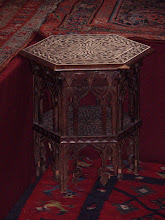 For a foreigner one of the most stricking things about Sarajevo is to hear the call to prayer five times a day from the minarets of mosques. For those who live here it, whatever their religion, it quickly becomes a feature of the day, reminded you of the passing time. Many I know miss hearing it when they move out. Although a lot of people say ˝it was always so˝ there is a begining to everything. The first call to prayer was uttered by Bilal ibn Rabah sometimes known as "Bilal al-Habashi" who was an Ethiopian born in slavery in Mecca in the late 6th century, sometime between 578 and 582. Stories say that Bilal had accepted Islam secretly and once his master (an ennemy of Islam) learned about it he was persecuted. However, prophet Muhammad heard about him and asked Abu Bakr to buy him and free him. Bilal was known for his beautiful voice and prophet Muhammad chose him to call people to prayer making him effectively the first muezzin in history. Bilal could not pronounce the Arabic letter 'sheen' properly and instead used the letter 'seen' (the two sounds had merged in "s" in classical Ge'ez an old Ethiopian language). So some people complained and suggested that someone else should call for prayer. Prophet Muhammad then said, "The 'sin' of Bilal is 'shin' in the hearing of God," underlying that the value of a man's prayer is not his pronounciation but the purity of his heart. He died sometime between 638 to 642.
For a foreigner one of the most stricking things about Sarajevo is to hear the call to prayer five times a day from the minarets of mosques. For those who live here it, whatever their religion, it quickly becomes a feature of the day, reminded you of the passing time. Many I know miss hearing it when they move out. Although a lot of people say ˝it was always so˝ there is a begining to everything. The first call to prayer was uttered by Bilal ibn Rabah sometimes known as "Bilal al-Habashi" who was an Ethiopian born in slavery in Mecca in the late 6th century, sometime between 578 and 582. Stories say that Bilal had accepted Islam secretly and once his master (an ennemy of Islam) learned about it he was persecuted. However, prophet Muhammad heard about him and asked Abu Bakr to buy him and free him. Bilal was known for his beautiful voice and prophet Muhammad chose him to call people to prayer making him effectively the first muezzin in history. Bilal could not pronounce the Arabic letter 'sheen' properly and instead used the letter 'seen' (the two sounds had merged in "s" in classical Ge'ez an old Ethiopian language). So some people complained and suggested that someone else should call for prayer. Prophet Muhammad then said, "The 'sin' of Bilal is 'shin' in the hearing of God," underlying that the value of a man's prayer is not his pronounciation but the purity of his heart. He died sometime between 638 to 642.Pour un étranger entendre l'appel à la prière lancé du haut des minarets des mosquées cinq fois par jour est assez frappant. Pour ceux qui vivent ici, quelle que soit leur religion cela rythme leur journée et leur rappelle le temps qui passe. Nombreux sont ceux à qui cela manque quand ils quittent le pays. On entend souvent dire ˝cela a toujours été ainsi˝ mais il y a un début à tout. Le premier appel à la prière a été le fait de Bilal ibn Rabah connu aussi sous le nom de "Bilal al-Habashi", un esclave éthiopien né à la Meque à la fin du 6ème siecle. On dit que Bilal avait accepté l'Islam en secret et quand son maître (un ennemi acharné de l'Islam) l'appris il le persécuta. Ceci parvint aux oreilles de Mahomet et celui-ci demanda î Abu Bakr de l'acheter et ainsi de le libérer. Bilal était connu pour sa voix mélodieuse et Mahomet le choisit pour appeller les fidèles à la prière faisant ainsi de lui le premier muezzin de l'histoire. Bilal avait un défaut de prononciation en arabe et ne pouvait prononcer la lettre ˝chine˝correctement et disant à la place ˝sin˝ (en Ge'eez classique – une langue ancienne éthiopienne les deux sons sont confondus). Certaines personnes s'en plaignirent et suggérèrent qu'un autre appelle a la prière. On rapporte que Mahomet repondit à ceci en disant ˝Le 'sin' de Bilal est 'chine' à l'oreille de Dieu˝ rappellant ainsi à tous que dans la prière l'essentiel n'est pas la prononciation mais la pureté du coeur. Il mourut entre environ 638 et 642.
What is the muezzin chanting? Que chante le muezzin?
Allah is The Greatest
Allah est le plus Grand
2x
2x
اشهد ان لا اله الا الله
Ash-hadu an lā ilāha illallāh
I bear witness that there is no lord except Allah
Je témoigne qu'il n'y a pas d'autre seigneur que Allah
2x
اشهد ان محمدا رسول الله
Ash-hadu anna Muhammadan rasūlullāh
I bear witness that Muhammad is the Messenger of Allah
Je témoigne que Muhammad est le Messager de Allah
2x
حي على الصلاة
Hayya 'alas-salāt
Make haste towards prayer
Hatez-vous vers la priere
2x
2x
حي على الفلاح
Hayya 'alal-falāh
Make haste towards welfare [success]
Hatez-vous vers la prospérité
2x
الله اكبر
Allah u akbar
Allah is greatest
Allah est le plus Grand
1x
لا اله الا الله
Lā ilāha illallāh
There is no lord except Allah
Il n'y a pas de seigneur sauf Allah












1 comment:
wow. thank you so much for posting this. i really appreciated that.
and i do, indeed, miss the call to prayer very much. there's nothing like it in wisconsin!
michelle
Post a Comment